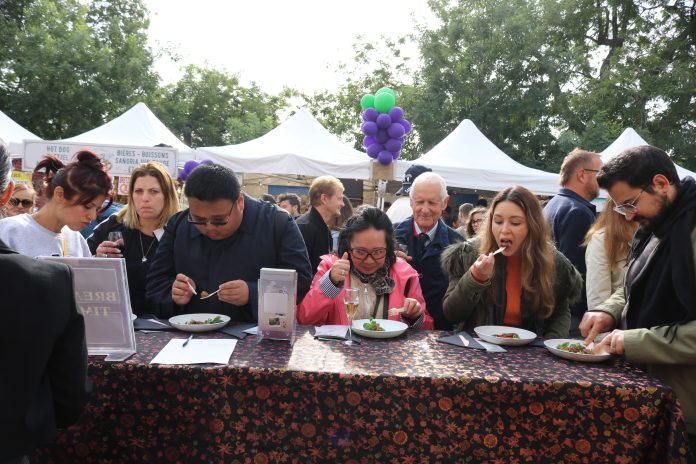By Raza Syed
As the shadows of the trees grow long and the final whispers of summer warmth linger, the arrival of October is gently heralded in Paris. The golden leaves of autumn drift from the trees, the air cools, and the city’s famed winds begin to shift. In this season of transformation, the anticipation builds for one of Paris’s most cherished events—the Montmartre Wine Harvest Festival. This annual gathering, which fills the streets of the Montmartre district, draws visitors from all over the world to experience a five-day celebration of taste, culture, and community.
Having begun in 1934, the Montmartre Wine Harvest Festival has become a pillar of Parisian tradition. Held each October, it is the third busiest event in Paris after Nuit Blanche and the Paris Pledges, with an attendance of around 500,000 visitors. What makes this festival so unique is not just the history of Montmartre, known for its artists and vineyards, but also the diversity it attracts, blending cultures, flavors, and performances from every corner of the globe. This year, I had the pleasure of attending this extraordinary event and immersing myself in its colorful festivities.
The fair boasts a variety of attractions, with something for everyone. Attendees can enjoy exhibitions and live performances that transform the streets into an open-air theater of art and music. The festival lineup includes musical performances, parades, and traditional dances that add an enchanting ambiance to the lively streets. Vendors and artisans from various regions set up stalls, offering a vast range of foods and crafts that highlight both international and local flavors. For Parisians and tourists alike, it is an opportunity to stroll through a marketplace of unique culinary experiences while surrounded by the artistic spirit Montmartre is famous for.
As I walked among the booths, one of the most captivating sights was the South Korean pavilion, adorned with its national flag and drawing a curious crowd of festival-goers. South Korea’s contribution to the festival was as vibrant as it was educational, offering visitors a taste of Korean history, culture, and—most importantly—its cuisine. For those eager to try Korean dishes, this pavilion was a rare opportunity to sample authentic flavors prepared according to traditional methods. Among the dishes served were jeongya, a savory braised chicken or meat dish, and bulgogi, a marinated and grilled meat delicacy. Both dishes were prepared following recipes from SooWoonJapBang, a 500-year-old cookbook regarded as a national treasure in Korea. The long queue of visitors waiting for their turn to taste these authentic dishes was a testament to the universal appeal of Korean flavors, as well as the festival’s power to foster cultural exchange.
The Montmartre Wine Harvest Festival not only brings together people and cuisines from around the world but also gives visitors a chance to discover Paris from a different perspective. Though famous as a city of fine dining and haute cuisine, Paris has in recent years embraced a more global palate, welcoming international influences to its culinary scene. The Korean pavilion was one of many that showcased how food can serve as a bridge between cultures, sparking curiosity and appreciation among festival attendees.
Reflecting on my experience at the Montmartre festival, I recalled another event I attended earlier this year—the “Taste of London” festival, held in June in the capital of Great Britain. Like the Montmartre Wine Harvest Festival, “Taste of London” gathered chefs, vendors, and culinary enthusiasts to celebrate food and drink from all over the world. The Korean food stalls there, known collectively as “K-Food,” were also a major highlight, offering a similar selection of traditional dishes. Despite the long lines, visitors patiently waited to savor these dishes, which had been meticulously prepared by Chef Kim Do-eun, an internationally acclaimed Korean chef. It was inspiring to see the enthusiasm and interest from attendees in experiencing authentic Korean flavors, a sign of the growing popularity of Korean cuisine worldwide.
Both festivals—the Montmartre Wine Harvest Festival and Taste of London—offered more than just food; they were experiences that engaged all the senses. From the taste of traditional dishes to the sight of cultural pavilions, the sounds of music and laughter, and the shared joy of festival-goers, these events celebrated the universal language of food.
For Paris, the Montmartre Wine Harvest Festival represents not only a time-honored tradition but also a celebration of community, diversity, and connection. It embodies the spirit of Montmartre itself, a neighborhood known for its blend of history, art, and culture. This festival allows visitors to feel the soul of Montmartre—to wander its storied streets, sample flavors from around the world, and experience firsthand the warmth and vibrancy that characterize this beloved neighborhood.
As October comes and goes, and the colors of autumn fade to winter’s chill, memories of the Montmartre Wine Harvest Festival linger. For those who attend, it is not just a festival, but a journey that brings together the past, the present, and the flavors of many cultures, leaving a lasting impression that will endure until the festival returns once more.
What do people think about Korean food?






